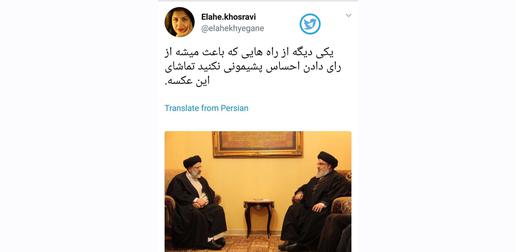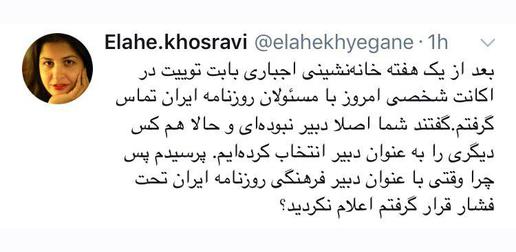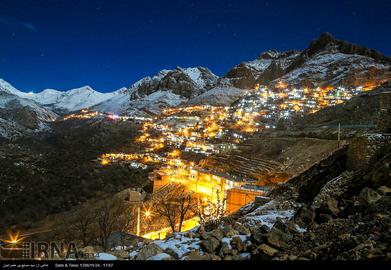The suspension and demotion of Elaheh Khosravi, a culture editor for the official newspaper Iran, has led to renewed debate about the plight of the country’s journalists.
Elaheh Khosravi was suspended and demoted after posting a tweet in January that insulted former presidential candidate Ebrahim Raeesi and implicitly supported the re-election of Hassan Rouhani as president.
Khosravi tweeted from her personal account, posting a photograph of a meeting between the ultra-conservative Raeesi and Hassan Nasrallah, the Secretary General of the Lebanese Hezbollah with the comment: “One way not to feel sorry about your vote is to look at this picture.”
A backlash ensued, with supporters of Iran’s hardline conservatives going on to Twitter to attack Khosravi. “This tweet by the culture editor of Iran newspaper shows her animosity towards Hezbollah and Hassan Nasrallah,” tweeted Vahid Shourabi, who describes himself on his profile as a “student activist” and the “Secretary of the Coordination Committee of Students’ Basij at Azad University” [Persian link]. He then said she should lose her job because of her comments. “This traitor must not have a job at the newspaper associated with the government of the Islamic Republic.” His tweet also provided the phone number of Mohammad Fazeli, managing editor of the newspaper Iran. “We can let [him] know about our protest by sending him text messages,” Shourabi wrote.
It now appears that Vahid Shourabi got what he wanted. On February 9, the newspaper Iran — the official newspaper of the Iranian government — informed its readers that Khosravi had been suspended. Elaheh Khosravi’s tweet supported President Rouhani’s success in securing a second term, but it still led to her suspension.
A colleague of Khosravi said that she had been on a forced leave of absence for a week, but that she could return to work for the newspaper on February 12, but only as a reporter. She will no longer be working as a culture editor, the colleague said.
“I contacted the managers of Iran newspaper after a week of being forced to sit at home,” Elaheh Khosravi said on Twitter. “They told me: ‘you were never an editor and we have chosen another person as the editor.’ I asked: ‘Why didn’t you say so when I was put under pressure?”
On February 11, Iran newspaper said in a statement: “By accepting the rules of conduct for working with a publication, Ms. Khosravi can continue her cooperation with Iran newspaper that started six months ago as a freelance reporter.” [Persian link]
The statement makes it clear that Khosravi was not an editor for the paper, and that, because she is a freelancer, she is not salaried.
Seyyed Ataollah Mohajerani, who was Minister of Culture and Islamic Guidance under Mohammad Khatami’s administration (1997-2005), warned President Rouhani that if Elaheh Khosravi is not returned to her job “as the culture editor of Iran newspaper”, Rouhani’s name will be remembered as one of the people responsible for her firing.
As of February 16, Elaheh Khosravi’s twitter feed said nothing about her returning to work on February 12 as her employers had suggested would happen.
A Familiar Tactic
Khosravi further tweeted about her frustration with her employers. “Not only are they not ready to pay the price for working with me, but they even do not want to take responsibility for firing me,” she said. This way, she might feel forced to resign — a tactic Iranian media outlets regularly use against journalists.
Reactions to Elaheh Khosravi’s dismissal (or at least demotion) came in two forms. Some criticisms were directed at conservative activists who had pushed for her dismissal on Twitter. Others criticized the officials of the newspaper Iran, who yielded to their demands.
The main criticism, however, was directed at the overall situation for Iranian journalists. “Elaheh Khosravi lost her job because the officials of the paper did not have guts,” tweeted the journalist Morteza Naemeh. “We don’t have a union but I wish the Islamic Culture and Guidance Minister...would remind the officials of his newspaper whose government they are working for.”
Some blamed the newly-founded Tehran Journalists Society. “In this country nobody, absolutely nobody, cares about journalists,” tweeted journalist Iman Paknehad. “The only place where one could expect support was from the journalists’ society but they withheld even a simple comment, let alone a statement of protest.”
“In the absence of a trade association and a union,” tweeted Khosravi, “if we ourselves yield to discrimination and watch in silence then it would be better if we do not call ourselves journalists.”
Major media outlets around the world have rules about their employees’ conduct when posting on social networking sites. For example, BBC editors remind their reporters that if they are in doubt about whether or not they should post something, they should assess whether the comment would be appropriate if published by the BBC itself. And it reminds them that online, personal space and public space are one and the same.
But Iranian media have no such explicit rules and bylaws. So if the comments posted rub the authorities the wrong way — whether its media bosses or the Ministry of Culture and Islamic Guidance, the Press Supervisory Board or security agencies — the journalist is ultimately the loser. And it is authorities who, after the fact, decide what is right and what is wrong, when guidelines might have instructed the journalist what to do and what to avoid.
visit the accountability section
In this section of Iran Wire, you can contact the officials and launch your campaign for various problems


























comments